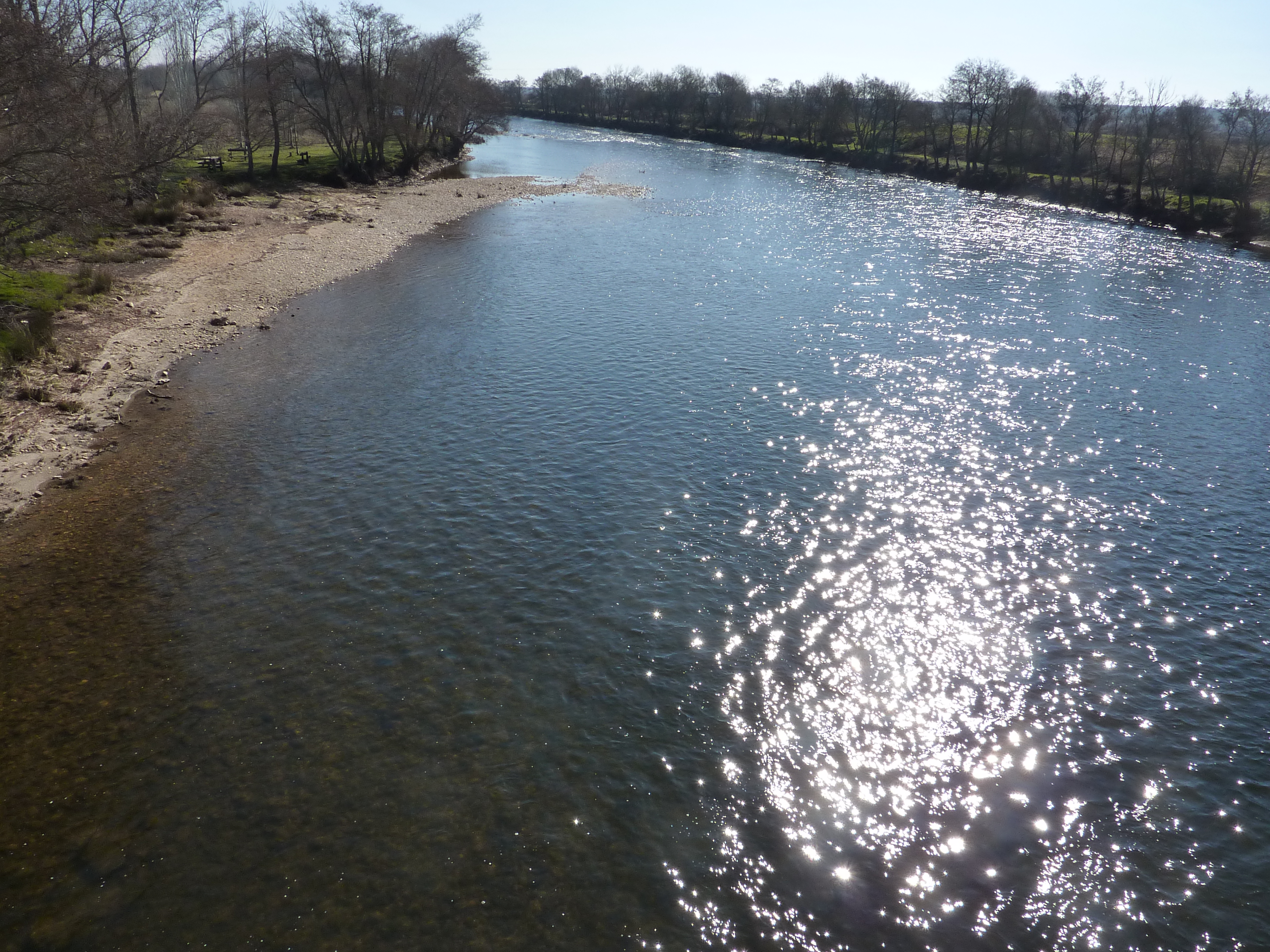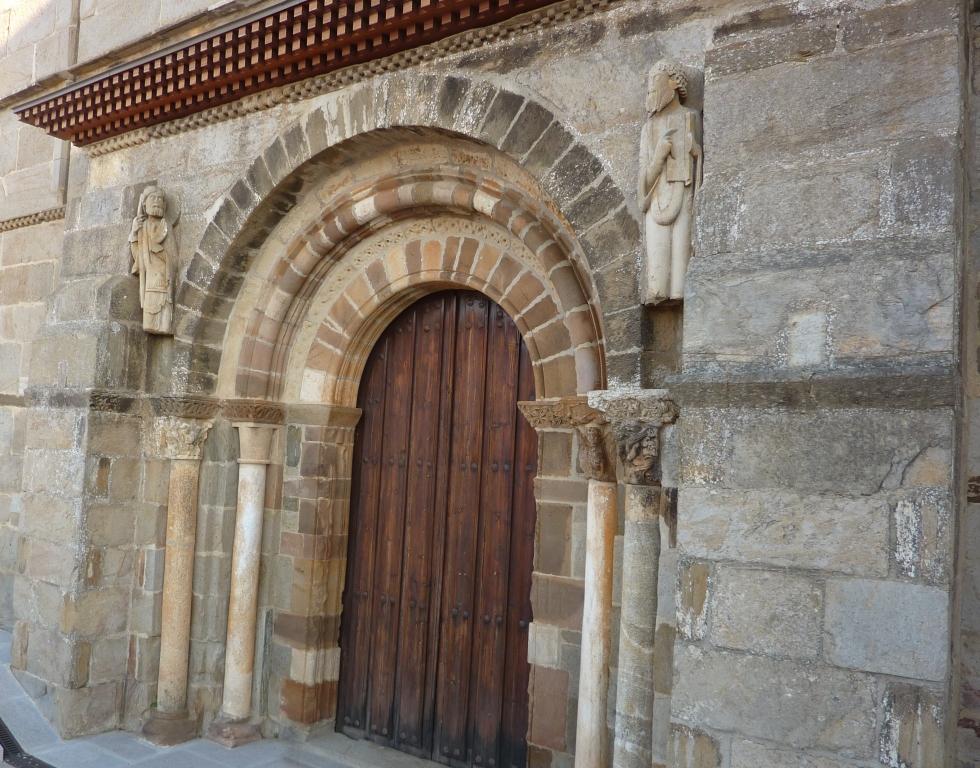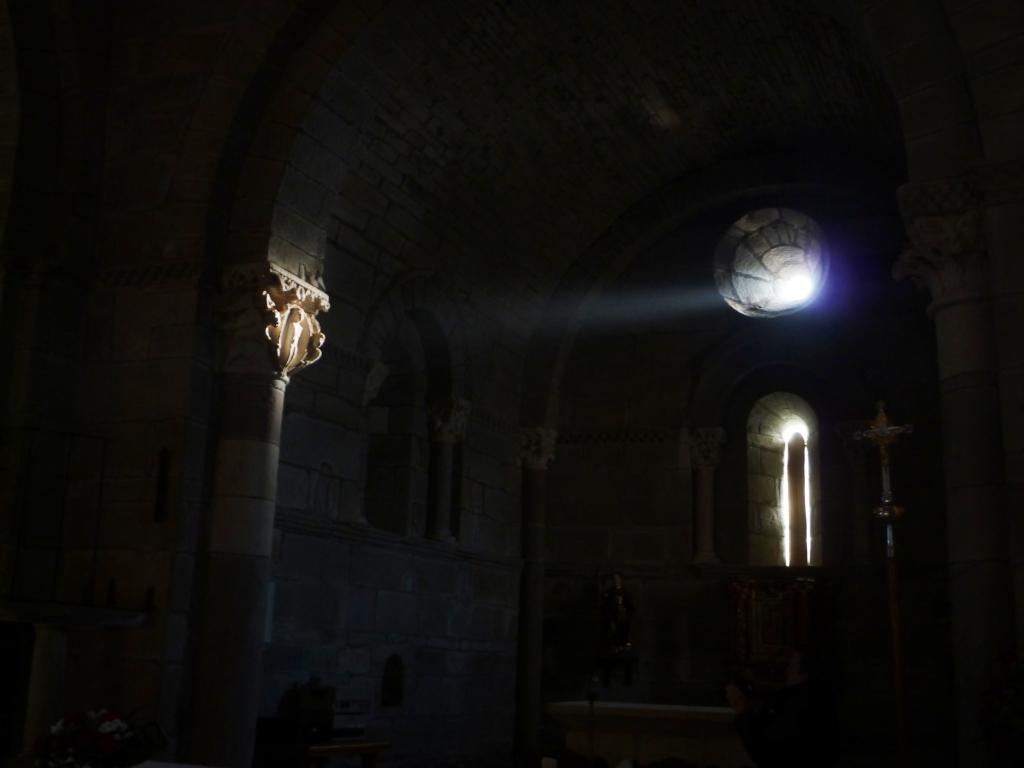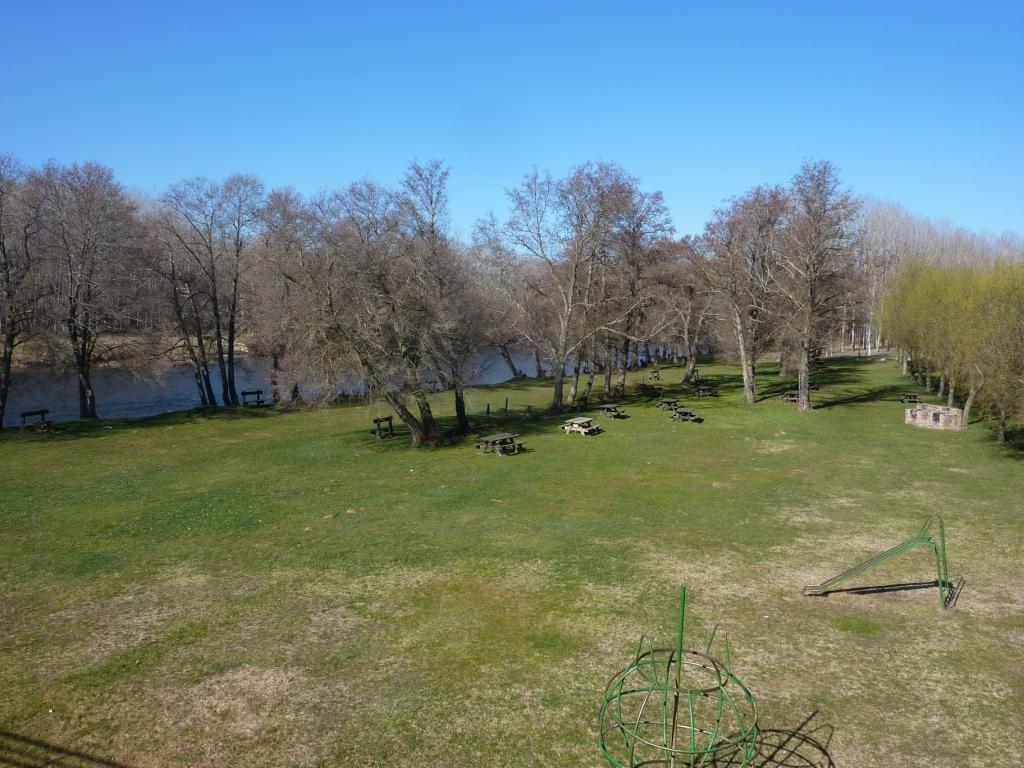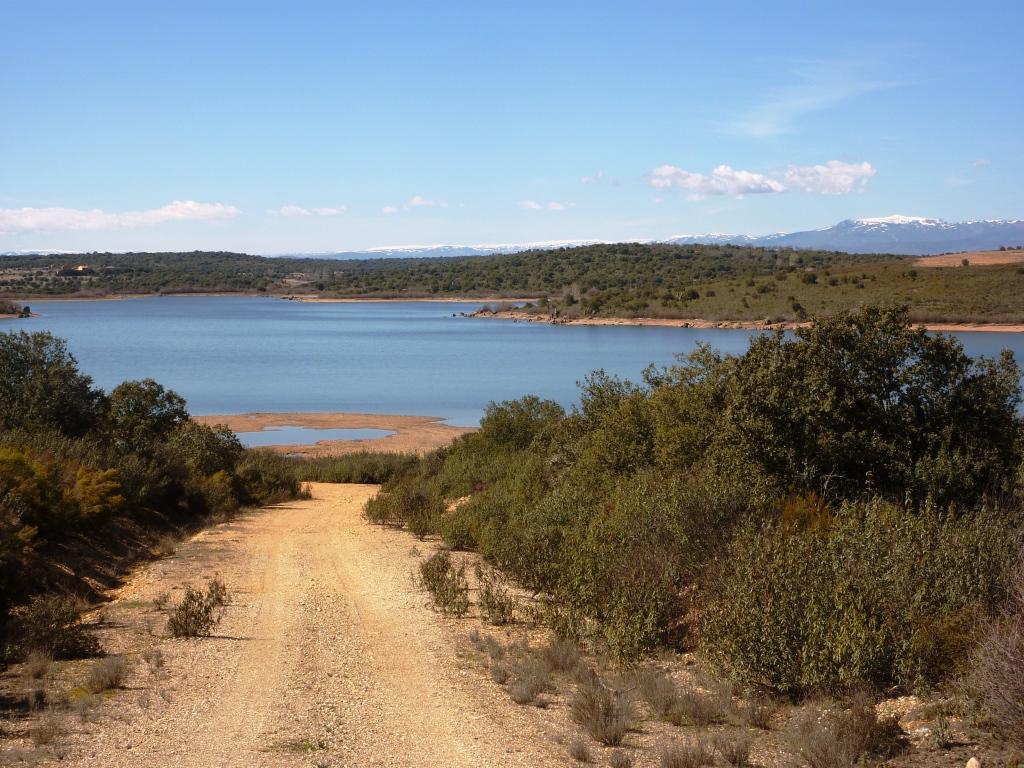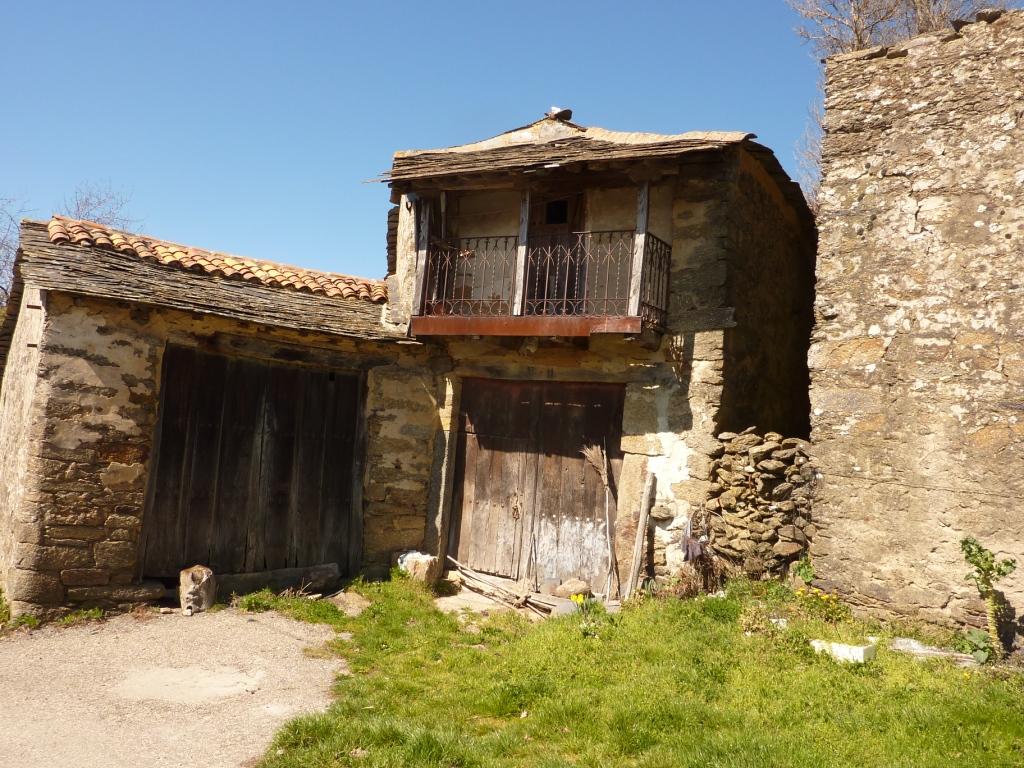Rio Tera, a valley of peace on the Camino Sanabrés
On the Camino Sanabrés before entering Galicia, through a labyrinth of mountains, the camino passes through the valley of the Rio Tera and alongside the Embalse de Cernadilla, which has been created by damming the river. The pilgrim arrives first at Santa Croya de Tera with two albergues, one being private and with a good reputation. I chose, though, to cross the river to Santa Marta de Tera where the local authority offer a basic room with beds and blankets and where I was alone. In Santa Martathere is a church with one of the oldest statues of St James, the pilgrim-apostle, outside the South porch.
Another curiosity about this church is that on the spring and autumn equinox the sun enters the east window above the altar and falls directly upon a carving of the Virgin on one of the pillars. I happened to be there on 20st March and, as I was leaving the albergue, people were heading for the Church and insisted I go with them to see this special event. A small group watched in silence as the sun’s rays reliably, at 10 am on the dot, fully set light upon the statue. [10 am BST+1 in winter. I have no idea why this should be significant] I had slept well and alone in the municipal albergue so I expressed great wonder at this spectacle. It was followed by a Mass as the sun got on with its job of heading westwards, although I believe we now think it is we, on the earth, who move and not the sun. However, watching the sun’s rays climb up the pillar to the statue, I can forgive the architects for imagining otherwise and wonder how much worse off we would be if we still believed this.
The valley is a gentle walk accompanied by the river. Each day was crisp, dry and sunny like spring on the East coast of Scotland can be with some luck. It was a joy to walk and my only care in the world was to avoid having to sleep in the same room as an Austrian man whose snoring had driven me to flit to the kitchen floor for the night in the albergue in Tabará two nights before. He had stayed in the posh German run albergue in Santa Croya while I had continued to Santa Martha. As always when we harbour fears we somehow engineer, by an as yet un-named subconscious strategy, to bring about exactly what we have been dreading. When I arrived at Rionegro del Puente on this uplifting equinox, Herr Grünter was already established in the albergue which has two rooms. Even better, one was upstairs. Delighted, I set up my sleeping bag in the empty upstairs room and showered. When I returned from the bathroom my fellow pilgrim had decided to keep me company upstairs and had installed himself in a bed opposite mine. “I don’t really like sleeping in these big rooms alone,” he said. Feebly I replied, “I don’t mind.” My intention was to convey that I don’t mind sleeping alone in an aircraft hangar. I had utterly failed to convey that I minded very much. The next day I bought some ear plugs.
This was the Camino on which I was learning about praying all the time. These days by the river Tera were ideal and, apart from my Austrian friend at night, were full of silence. The camino was well-marked and easy to follow with snow capped mountains beckoning ahead. This business of praying all the time is about trying to focus constantly on the presence of God within. The less I am carrying in terms of reactions such as resentments, or worries such as where I can buy some food or fears about not having a quiet night, the more empty I am. Walking the Camino simplifies life to a few basics, and any problems I carry with me from the “world” in the first few days of a camino soon fade. Of course, thunderbolts happen, like Movistar phones me with threats for not paying them. When I feel cheated by mobile phone companies I’m hardly empty enough to dwell on God’s presence within me. Movistar and sorting my fight with them takes first place – until I can put it all in perspective.
The desire to pray constantly means working on perspective. It amazes me how many day to day niggles are put into perspective by walking long distances immersed in the beauty of nature. One of the most practical uses of religion is to help us stand back and see the trivia, that is most of life, with which we become obsessed. The raw nature in which I can spend months on a Camino opens horizons one after the other. Putting the trivia in its place gives me freedom for what is left. What is there, mostly, is peace, love and light(ness). There is also the sigh, compassion and a sense of unity with all creation. All of this speaks of the divine within me. My Catholicism gives me images, stories, poetry and music with which I can externalise my prayer so that I can connect with others who share the same religious/cultural context, It can be rich and colourful when God is present: when He is not there, there is anticipation of his return, trust, faith and waiting. Altogether, praying all the time is nearly possible and my first attempts have been helped by isolation in deserted places.
I was not to be spared distractions from prayer that evening. My last night in this valley was spent in a brand new albergue in Asturianos which was attached to a brand new and huge sports pavillion with seating for 250 and it’s own bar, all of which must serve the local population of 267 well, especially the 62% of them who have to make do on their pension. They have the possibility of playing football, volleyball and basketball as well as pelota. For the pilgrim, I felt that the double sized hydro-massage showers were more than we deserve: yet there were only three of these even though the albergue could accommodate six people. What wonderful facilities Spain constructed for the few in such remote spots during its economic boom, the one before the economic BOOM!! My thoughts overran my inner silence and kept returning to Spain’s massive public spending with a mixture of disbelief and scorn which could easily have become for me the pleasure of justified disgust at the comfort I was enjoying. How much better it would have been to sleep under the stars had it not been for the generous heating in the bedroom and showers. As if in compensation for my being distracted from my contemplative prayer, the albergue had been built just far enough off the camino, and up a hill, to put off some pilgrims, which meant I was alone. My Austrian friend must have found other company.

